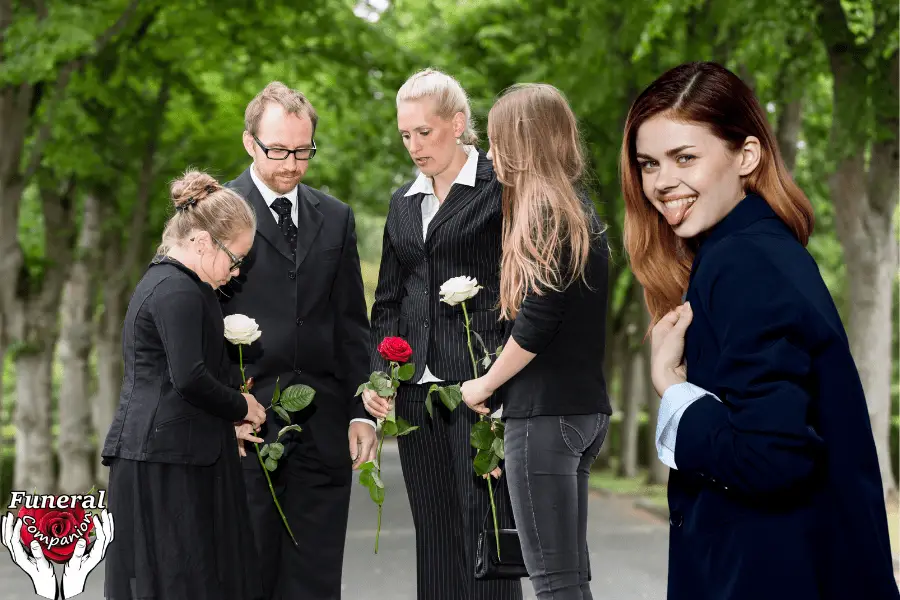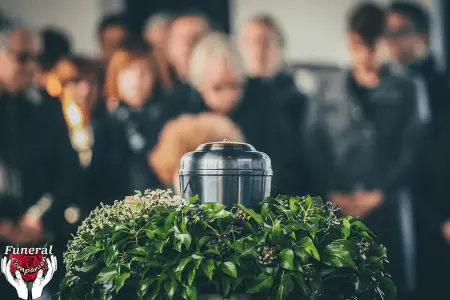Funerals, although they happen every day, only happen to you personally once in a while. They are frankly strange events in our lives and having to conduct a conversation while attending one can sometimes get weird. That is unless you know what you are doing.
Make your conversations polite and as brief as you can when talking to people that you don’t know at funerals. Focus on the life of the deceased but don’t dwell on the manner of their death or any flaws in their character. If in doubt, prompt the other person to speak about their memories.
The possibility of things getting awkward and downright weird during a funeral is highly possible, especially if you didn’t know the deceased or their family well.
But don’t fret, I’m going to cover everything you need to know to avoid this in the following article.

What’s the best thing to say at a funeral?
Funerals are extremely stressful times for families. Not only is there the stress connected to planning the funeral but also the grief of their loss. In essence, they won’t be expecting entertaining conversation from you, they just want to get through this tough day.
So, sticking to the tried and tested phrases when you greet a bereaved spouse or close family member is absolutely fine.
Here are some suggestions:
Greetings
- I am so sorry for your loss
- I was so sad to hear of X’s passing
- I was so sorry to hear the news, he/she was a wonderful man/woman
- He/she will be missed by everyone that knew him/her
Introductions
- Hello, I’m X I’m a friend of the family
- I’m related to X through my X
- I met X at X
- I didn’t know X very long but he/she really touched my life
Farewells
- You will be in my thoughts and prayers
- It was a beautiful ceremony, he/she will be greatly missed
- he/she was a wonderful person and it was a privilege to celebrate their life with you today.
- Please call me if you need anything or you want to talk
It’s best not to fall back on even more cliché phrases like ‘they are in a better place’ or even worse, ‘I’m so happy to be here’.
What to say to a bereaved family member
The most important thing to do when talking to bereaved families is to make it clear that they are allowed to grieve. When you know the person well, be forward. Enquire about their feelings and if they want to talk about their loss. Don’t avoid the topic of death as this is not at all helpful.
It’s a delicate balance because you don’t want to upset the person, but it is important for them to know that they are allowed to feel emotional, especially today.
Elisabeth Kübler-Ross made the notion of the five stages of grief a world sensation (Denial, Anger, Bargaining, Depression, and Acceptance), and your conversation will depend on where the person is in this journey of grief (Speak to a professional today from the comfort of your home).
The best thing to say is ‘I’m so sorry for your loss, I’m here if you want to talk’. This allows the person to share their feeling if they want, be it anger or sadness.
How to introduce yourself at a funeral
When attending a funeral alone or within a group, you don’t know well, be proactive when introducing yourself. Keep to how you know the deceased, even if you didn’t, and express your condolences. Don’t crack awkward jokes or talk about inappropriate topics like work, sports or existentialism.
The entire point of a traditional funeral is to allow a group of people to grieve together. Grieving people may not be as sociable as they may otherwise be, so don’t be afraid of making the first move.
Unlike other social occasions, it’s obvious why everyone is at a funeral and this can be a good ice breaker. Being a good listener and asking about fond memories or stories concerning the deceased can be an easy way to make conversation.
When the conversation dries up, don’t be afraid to move onto the next group and try the same lines.
What to say to someone you don’t know at a funeral
It’s highly likely that if you go to the funeral of someone you didn’t know alone or with a spouse who is mingling, you’ll have to make conversation with a stranger.
Be assertive, introduce yourself, and explain your relationship with the deceased even if it’s through someone else. Encourage the stranger to do the same. Express your sorrow at your mutual loss and offer your condolences.
When things start to get awkward, safe topics of conversation are the service if it’s already happened or enquiring about the other person’s fondest memories of the decceased.
Try to avoid any controversial topics of conversation such as current affairs, religion, or health. As this is a celebration of life, you can allow the conversation to move to your family and their activities. Even talking about your job may be inappropriate unless the other person brings it up first.
What to do when you didn’t know the deceased

If you are attending the funeral of someone you didn’t know at all, it’s ok, to be honest about that. Assuming that you are going with someone who did know them, it’s perfectly understandable that you are there to help them.
When making introductions, you can lead with the fact that you are the spouse, partner, or friend of someone who was related to or knew the deceased.
Being a stranger is actually a good outlet for many people to tell their most cherished stories to. You can allow the focus of the conversation to rest on the memory of the deceased and just be a patient listener.
If, however, you are gatecrashing a funeral, you should probably keep that a secret and not do it at all!
What to say to the officiant (if they corner you!)
The officiant, the priest, Rabbi, or Iman depending on the venue of the ceremony, may try to engage you in conversation. It’s just as likely that they don’t know anyone there either, but they could be equally very close to the deceased.
If you get stuck talking to the officiant the best course of action is to simply thank them for delivering a beautiful service, even if they were awful, and to keep the conversation focused on the rest of the proceedings.
Try not to get into a religious debate if you can help it and don’t enquire whether or not business is good at the moment!
How do I stop laughing at a funeral?
Quickly distracting your train of thought is the best way to stop yourself from laughing at a funeral. Wanting to laughing a funeral isn’t that strange or unusual, it’s a result of an unusual event, stress and often grief. However, it may upset others so you should stop yourself quickly.
The best way to stop yourself laughing, or at least not impact on the mourning of others, is to remove yourself from the situation as quickly as you can.
When this isn’t an option, try:
- taking deep breaths to calm yourself
- sipping at water
- trying to focus your mind on objects in the room
- thinking about something which disgusts you
Unless you have a medical condition, laughing at a funeral is just your way of processing what is happening. It may be because you are trying to suppress the urge to cry or feel stronger emotions of grief.
When your upbringing didn’t encourage you to feel the appropriate emotion at the right time, such as crying, you may react in other ways.
Generally, laughing during the funeral ceremony or at the graveside and when a casket is being taken away to be cremated are not appropriate times. However, laughing during a wake or post-funeral meal can be highly appropriate.
Just remember, that you aren’t the only one who does this, but you should try to stop yourself from being the only one laughing out loud in the worst possible moment.



